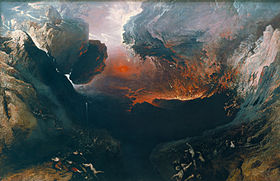
| Part of a series on the |
| Attributes of God in Christianity |
|---|
 |
| Core attributes |
| Overarching attributes |
| Miscellaneous |
| Emotions expressed by God |
| Part of a series on |
| Theodicy |
|---|
Divine retribution is supernatural punishment of a person, a group of people, or everyone by a deity in response to some action. Many cultures have a story about how a deity exacted punishment upon previous inhabitants of their land, causing their doom.
An example of divine retribution is the story found in many cultures about a great flood destroying all of humanity, as described in the Epic of Gilgamesh, the Hindu Vedas, or the Book of Genesis (6:9–8:22), leaving one principal 'chosen' survivor. In the first example, it is Utnapishtim, in the Hindu Vedas it is Manu and in the last example Noah. References in the New Testament and the Quran to a man named Nuh (Noah) who was commanded by God to build an ark also suggest that one man and his followers were saved in a great flood.
Other examples in Hebrew religious literature include the dispersion of the builders of the Tower of Babel (Genesis 11:1–9), the destruction of Sodom and Gomorrah (Genesis 18:20–21, 19:23–28) (Quran 7:80–84),[3] and the Ten Plagues visited upon the ancient Egyptians for persecuting the children of Israel (Exodus, Chapters 7–12).
In Greek mythology, the goddess Hera often became enraged when her husband, Zeus, would impregnate mortal women, and would exact divine retribution on the children born of such affairs. In some versions of the myth, Medusa was turned into her monstrous form as divine retribution for her vanity; in others it was a punishment for being raped by Poseidon.
The Bible refers to divine retribution as, in most cases, being delayed or "treasured up" to a future time.[4] Sight of God's supernatural works and retribution would militate against faith in God's Word.[5] William Lane Craig says, in Paul's view, God's properties, his eternal power and deity, are clearly revealed in creation, so that people who fail to believe in an eternal, powerful creator of the world are without excuse. Indeed, Paul says that they actually do know that God exists, but they suppress this truth because of their unrighteousness.[6]
Some religions or philosophical positions have no concept of divine retribution, nor posit a God being capable of or willing to express such human sentiments as jealousy, vengeance, or wrath. For example, in Deism and Pandeism, the creator does not intervene in our Universe at all, either for good or for ill, and therefore exhibits no such behavior. In Pantheism (as reflected in Pandeism as well), God is the Universe and encompasses everything within it, and so has no need for retribution, as all things against which retribution might be taken are simply within God. This view is reflected in some pantheistic or pandeistic forms of Hinduism, as well.
- ^ Michael Wheeler, Heaven, Hell, and the Victorians, Cambridge University Press, 1994, p.83
- ^ "Web Gallery of Art, searchable fine arts image database". www.wga.hu.
- ^ "Surah Al-A'raf [7:80–84]". Surah Al-A'raf [7:80–84].
- ^ Luke 3:7; Romans 2:5
- ^ For we are saved by hope: but hope that is seen is not hope...(Romans 8:24)
- ^ Craig, William Lane. "Is Unbelief Culpable?". Reasonable Faith. Retrieved 19 May 2014.